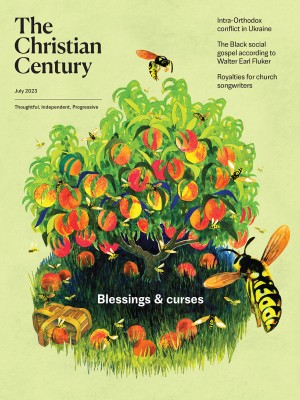The 13th-century scottish priest John Duns Scotus was one of the first to articulate the scandal of particularity. He argued that true relationship between God and humans is only possible in the specific and concrete. It’s difficult, if not impossible, to love concepts, ideals, and generalities.
Most Christians speak of the scandal of particularity in reference to the doctrine of incarnation. But it also comes up in discourse around the chosenness of God’s people through Abraham, Isaac, and Jacob. How is it that the Creator of the universe will bless and save the whole creation? By working in and through specific individuals, families, and communities in real time, in real places, over the course of many generations, up to this very day. By entering the limits of time and space to give birth, form relationships, and influence the stories of a few, God alters the story of the many.
Read our latest issue or browse back issues.
I haven’t always embraced the particularity of God. When I was on internship, I preached a sermon in which I disparaged the practice of praying for oneself. I could not endorse the idea of the almighty God of the cosmos caring intimately about my personal problems. I was, and continue to be, frustrated by how self-focused concern for personal salvation privatizes the Christian faith and makes it about “me and my Jesus” instead of about loving our neighbors through just and compassionate community action.
My supervisor challenged me by appealing to the stories of the patriarchs and matriarchs in Genesis. What about the Bible? The stories? The families? The people? The specifics? The ways God routinely intervenes? What about Abraham, Sarah, Hagar, Isaac, Ishmael, Rebekah, Esau, Jacob, Laban, Rachel, Leah? We know their ages and locations. We know their likes and dislikes. We know their inner thoughts and priorities. We know their rivalries. They weren’t just anyones, they were God’s beloved, particular, precious someones (and so are you, by the way).
Sure, the Psalms are communal songs, and the prophets speak to whole nations, and Jesus proclaims the kingdom of heaven to multitudes. But there are simply too many specifics in both scripture and our lived experiences to say that God is not interested in us as individuals.
On Easter Sunday this year, I heard the preacher say that to bring life out of death is God’s “brand” and always has been. Where there is barrenness, God brings fertility and growth. Where there is despair, God brings possibility and hope. Where there is sin and evil and death, God routinely intervenes to bring forgiveness, goodness, and life. Of course he said that! Christ is risen! Death doesn’t win! Love and life and light forever! Alleluia! Amen! And we make this proclamation for the world based on the experience and witness of a very few, particular people.
A friend of mine heard the same sermon. Holding her story of sorrow along with the celebration of Jesus’ resurrection, I felt a bit of a gut punch as the preacher spoke. Because as he spoke, she knew too well that God does not always make a barren womb fertile. No doubt others who were there knew firsthand that God does not always transform sibling rivalries into happy endings of forgiveness and reunion. And we all know, as we are daily bombarded with accounts of war, violence, and school shootings, God rarely brings dead children back to life.
When we hear the stories of God’s penchant for the particular, we inevitably relate to the human circumstances—like infertility, family strife, and tragic and untimely deaths. We can see ourselves in the story and hopefully imagine God with us too. But when God is silent—when God does not act on brand—we cannot help but wonder, justifiably, What about me?
Here we related not to the miraculous turnarounds God can perform for individuals but to the individual on the cross crying out, “My God, my God, why have you forsaken me?” There my friend sat on Easter morning, uttering words from Good Friday.
Ultimately, the scandal of particularity describes the way God chooses to fulfill the covenant with Israel and make all things new in Christ Jesus. It is good news. But on our way there, God’s particularity seems somewhat random and complicated, not unlike the story of our ancestor Jacob and his family. The Jacob sequence in Genesis is an incredible opportunity to extol how God gets into the gritty particulars of human lives. But I want to remember the power and necessity of sensitively naming the lived tensions where the text’s ancient stories collide with people’s lives today. Our lives happen in the space between the particular and universal, the individual and communal, the private and public, the weeping in the night and the joy in the morning, Good Friday and Easter Sunday.






